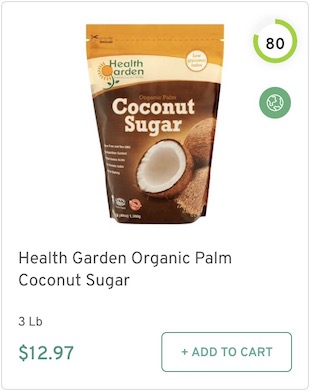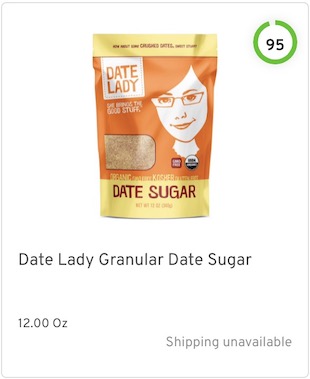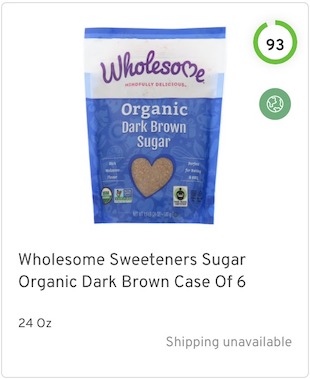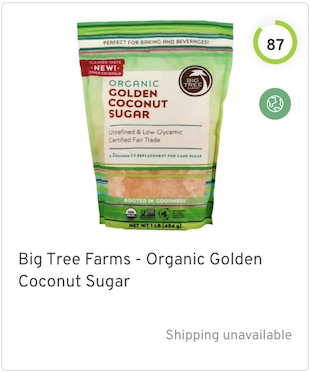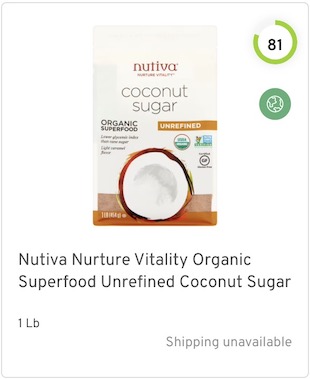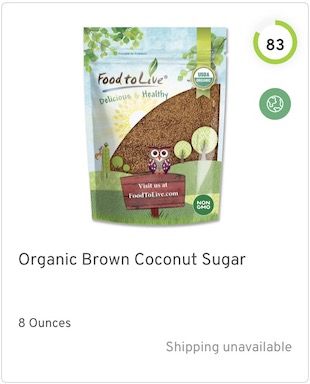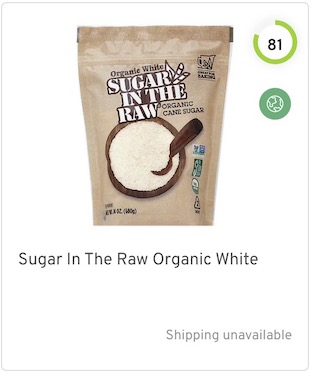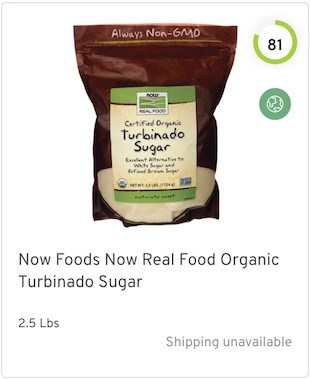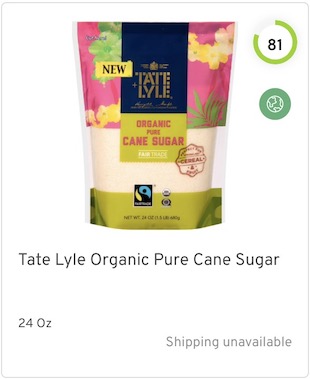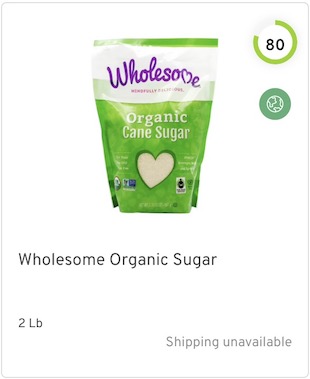Try our new free GreenChoice - Food Scanner mobile app!
DOWNLOAD-
-
-
Diets
Allergies
Take our 30-second quiz & we’ll filter our site to show only products that match your dietary preferences.
- GCNow
- Top 10 Organic Sugar Options to Stock Your Pantry
Top 10 Organic Sugar Options to Stock Your Pantry
Authors: Katherine Stallard, Merve Basoglu and Sydney WexlerPublished: September 9, 2021
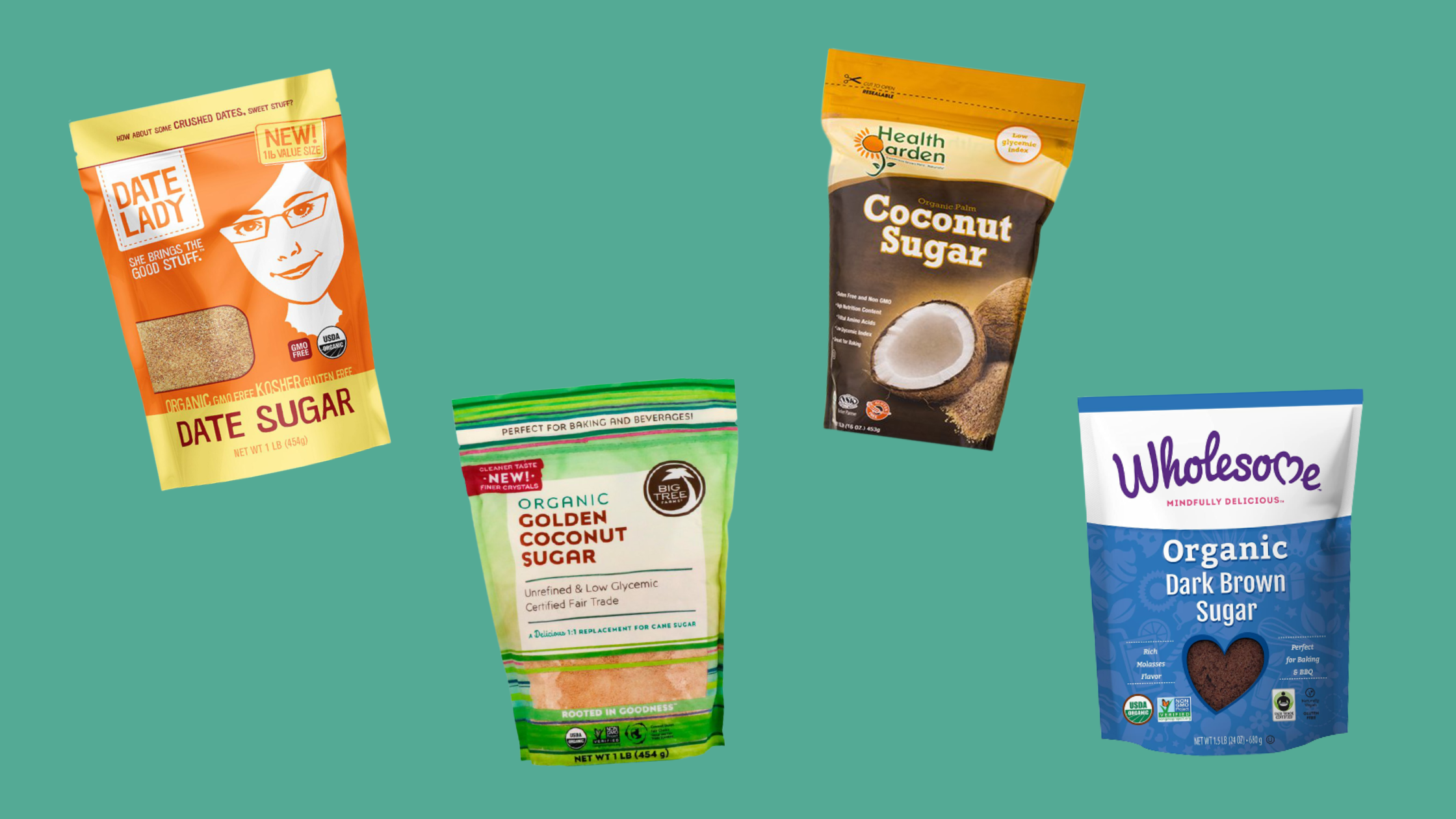
With all the different varieties and forms of sugar found on grocery store shelves, finding a high-quality sugar that aligns with your dietary values can turn into a bigger project than that cake recipe you’ve been wanting to try out.
Whether your sugar of choice is white or brown, powdered or granulated, a syrup, like honey or agave, sugar “in the raw,” or even naturally occurring or added — it can be a lot to dissect on your own.
With so many sugar descriptors out there, sugars with the organic label can become just another option that provides you with one more question and one less answer. It can leave you wondering what “organic” really means when it comes to sugar and whether it’s worth paying attention to in the sea of all of sugar’s other distinguishing traits.
While organic sugar can be extracted from either organically grown sugar cane or sugar beet plants, 80% of the world’s total sugar production is exclusively from sugar cane (2).
Opting for organic foods can reduce your risk of exposure to harmful pesticides. One study measured levels of several pesticides linked to food consumption in urine samples and associated an organic diet with significant reductions of pesticide exposure by an average of up to 59% (3).
It also supports food producers that prioritize the safety of their farmworkers by reducing their exposure to potentially harmful pesticides. In general, organic food products promote the sustainable use of natural resources, preservation of the environment, animal welfare, and human health.
Although the many sugar options available on supermarket shelves are understandably overwhelming, the organic label can help you distinguish for yourself exactly what kind of business practices you’re supporting.
Take a look at our list of the top 10 organic sugar selections on the market as well as our advice on how to choose the best one to quell your craving for something sweet while also making a more conscious choice for your body and the environment.
How to choose organic sugar
There’s a lot of options when choosing the best sugar to sweeten your food, so here are a few things to consider when making your choice:
- USDA organic certification. The USDA organic certification ensures all aspects of the food production process are organic. To be USDA-certified organic, the sugar must undergo a vigorous process according to a long list of rules and regulations (4, 5).
- Organic is not the same as unprocessed or unrefined. While organic sugar may curb your contact with pesticides in your baked goods, it isn’t unprocessed or unfiltered. The claim “organic” relates to both the way a crop is grown and how it is processed and handled, but sugar still must undergo processing to ensure it’s safe for us to eat. The FDA has ruled true raw sugar unfit for consumption in their regulation process, so to be organically certified, organic sugar manufacturers must comply with their rules. While it is still processed, it tends to undergo less processing than standard refined sugar (6, 7).
- Consume in moderation. While organic sugar is better for the environment because of the environmental consciousness used in its production, it isn’t nutritionally better than conventional sugar. Granulated sugar is still sucrose and can be harmful when consumed at too high a frequency. Enjoy sugar in moderation of less than 10% of your daily caloric intake to maintain physical health (8, 9).
GreenChoice Top Picks
1. Health Garden Organic Palm Coconut Sugar
This organic coconut sugar is extracted from coconut trees. It’s a good substitute for brown sugar and one cup of coconut sugar is equivalent to one cup of regular sugar.
More Organic Sugar Options
2. Date Lady Granular Date Sugar
This sugar is made from crushed dates and is USDA-certified organic. Since date sugar doesn’t dissolve well in liquids, it’s ideal for cooking and baking. It offers 1g of fiber per serving.
3. Wholesome Sweeteners Sugar Dark Brown
Wholesome’s dark brown sugar is made from cane juice and hand-harvested. It’s certified fair-trade, USDA organic, and ideal for baking and cooking.
4. Big Tree Farms – Golden Coconut Sugar
This coconut sugar is certified organic and Fair-Trade. It has finer crystals than regular coconut sugar which makes it dissolve in liquids easily.
5. Nutiva Nurture Vitality Superfood Unrefined Coconut Sugar
This unrefined coconut sugar is USDA-certified organic. It’s made from fresh coconut tree sap and has a lower glycemic index than cane sugar. Its caramel-like flavor makes it great in cookies or coffee.
6. Food to Live Brown Coconut Sugar
This organic brown coconut sugar contains calcium, iron, and potassium. It’s made from the flower of a coconut palm and it has a lower glycemic index than regular sugar.
7. Sugar In The Raw White
This cane sugar is made from sugar cane grown organically in Brazil. It has an Eco-Social certificate which ensures Fair-Trade standards as well as land usage, worker’s rights, and community development.
8. Now Foods Now Real Food Turbinado Sugar
This Turbinado sugar is made from partially-refined sugar cane extract and has larger crystals compare to refined white or brown sugar. It’s certified organic by QAI (Quality Assurance International).
9. Tate Lyle Pure Cane Sugar
This cane sugar is certified organic and Fair-Trade. It’s made with sugar cane and molasses. It’s ideal for beverages and baking.
10. Wholesome Organic Cane Sugar
This cane sugar is certified Fair-Trade, organic, and vegan. The sugar cane comes from sugar cane grown in Africa. It’s ideal for both hot and cold beverages and baking.
Key takeaways for shopping for organic sugar
With so many sugar options out there, understanding their differences can be a confusing task — especially when adding the “organic” label into the mix.
Organic sugar is a great option if you’re looking for sugar that will limit your exposure to harmful pesticides, as well as sugar that prioritizes the health of the environment during its production.
When choosing, remember to look out for the USDA-certified organic label to verify the sugar’s organic claims, but weigh your selection based on your personal criteria rather than only the label.
While being better for the environment and potentially reducing your intake of pesticides, organic sugar also isn’t unrefined and unprocessed. The USDA requires processing, so the sugar is suitable to eat, but it is a less processed alternative to ultra-processed options like standard refined sugar.
Sugar is also still sugar, and although it is organic, that does not mean it’s nutritionally superior to other types of added sugar. Enjoy it in moderation like you would any other sugar or sweet treat to monitor your health.
The next time you’re on the hunt for some sugar to sweeten up your next batch of cookies, beverages, or holiday desserts, consider our top 10 picks and tricks to guide you to an organic sugar that will be sure to keep your life sweet.
***
GreenChoice, PBC has evaluated and rated more than 340,000 food & beverage products across hundreds of attributes related to diet, health, and sustainability. Easily find the best products for you, the planet, & your budget. Sign up to access the GreenChoice marketplace, the first carbon-neutral online grocery marketplace for healthy, climate-friendly shopping.


